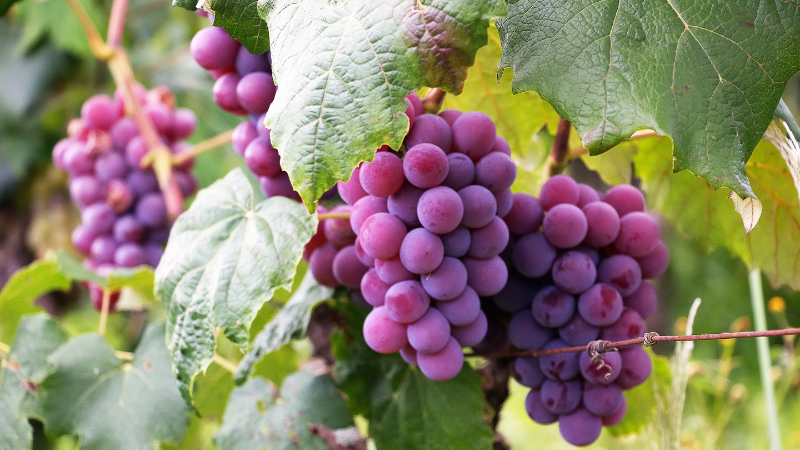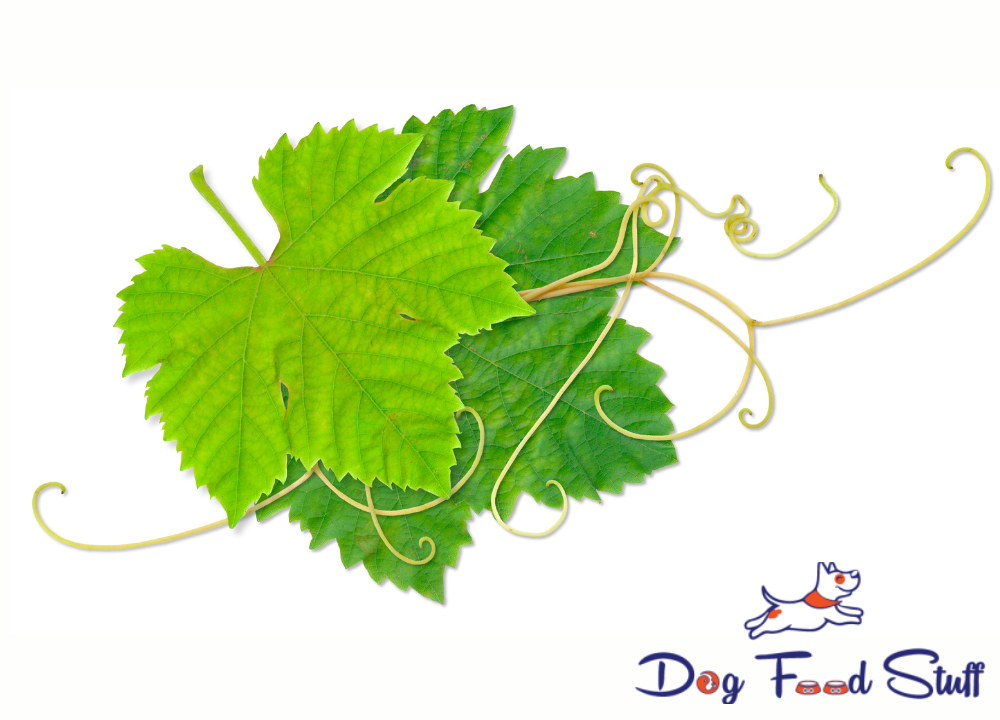Can Dogs Eat Grape Leaves: Expert Opinion
Dogs should not eat grape leaves due to the potential for toxic effects. Grape plants, in general, can be harmful to canines.
As a dog owner, it’s crucial to be vigilant of what your furry friend eats. Grapes and raisins are well-known for being toxic to dogs, but less is said about grape leaves. While there hasn’t been extensive research on grape leaves’ toxicity, experts recommend erring on the side of caution.
Given the severe reactions grapes can induce, including possible kidney failure, it’s advisable to extend this caution to all parts of the grape plant. By avoiding grape leaves, you prevent any risk they may pose to your dog’s health. It’s always best to stick to dog-safe foods and consult with your veterinarian about safe dietary options for your pet.
Can Dogs Eat Grape Leaves?
Curiosity about a dog’s diet often leads to questions like “Can dogs eat grape leaves?” As responsible pet owners, understanding what is safe and nutritious is crucial. While grapes and raisins are known to pose significant health risks to dogs, the topic of grape leaves is less widely discussed. In this detailed exploration, we’ll unveil whether these leaves make a safe snack for your furry friend.
Grape leaves might seem harmless at a glance, but the potential dangers can’t be ignored. Keeping a close eye on your pet after consumption is essential.
- Pesticides: Grape leaves can carry harmful chemicals used in vineyards.
- Thorns: Some grapevines have thorny stems that can cause injuries.
- Allergic Reactions: Dogs may develop allergies to plants, including grape leaves.
- Tannins: These compounds found in leaves could lead to stomach upset in dogs.
If you suspect your dog has ingested grape leaves, monitoring for any signs of distress and contacting your vet is wise.
When considering the nutritional benefits, grape leaves do offer positives. They are rich in vitamins and antioxidants. Here’s a brief overview:
| Nutrient | Benefit |
|---|---|
| Vitamin A | Supports vision and immune health. |
| Vitamin C | Boosts immunity and fights inflammation. |
| Fiber | Aids digestion and promotes gut health. |
Nonetheless, these nutrients do not outweigh the potential risks. It is best to err on the side of caution and stick to dog-safe alternatives.
Health Risks Of Dogs Eating Grape Leaves
Many dog owners wonder about safe snacks for their pets. While grapes and raisins are widely known to be dangerous for dogs, questions arise about grape leaves. In this section, we’ll dive into the health risks associated with dogs consuming grape leaves.
Toxicity Of Grape Leaves To Dogs
Grape leaves are potentially toxic to dogs. They may contain traces of toxins found in grapes, which are harmful to our canine friends. Despite the lack of concrete evidence, caution is always the best approach.
Symptoms Of Grape Leaf Toxicity In Dogs
Watch for these signs of toxicity if your dog ingests grape leaves:
- Vomiting or diarrhea
- Lethargy and weakness
- Abdominal pain
- Loss of appetite
Treatment For Grape Leaf Toxicity In Dogs
If you suspect your dog has eaten grape leaves, act quickly. Follow these steps:
- Contact your vet immediately.
- Avoid inducing vomiting unless directed by a professional.
- Be ready to provide details of ingestion: how much and when.
- Keep calm and follow veterinary instructions.
Treatment might include IV fluids, medication, or activated charcoal to absorb toxins. Early intervention is critical in preventing serious health issues.

Nutritional Value Of Grape Leaves For Dogs
When it comes to your dog’s health, incorporating various types of greens can be beneficial, but it’s crucial to understand what’s safe and what’s not. Grape leaves are a common query among pet owners, so let’s dive into the nutritional value they offer.
Vitamins And Minerals In Grape Leaves
Grape leaves are packed with goodness that can offer ample benefits:
- Vitamin A: Essential for vision and immune health.
- Vitamin C: Antioxidant that supports overall wellness.
- Vitamin K: Important for blood clotting.
- Iron: Vital for healthy blood cells.
- Calcium: Key for strong bones and teeth.
- Fiber: Great for digestive health.
Potential Health Benefits Of Grape Leaves For Dogs
Grape leaves can be a healthy addition, with potential benefits including:
- Improved digestion thanks to their fiber content.
- Stronger bones from calcium.
- Better immunity with the help of vitamins.
Safe Ways To Incorporate Grape Leaves In A Dog’s Diet
To ensure your dog enjoys the benefits without risks, follow these tips:
- Consult Your Vet: Always check before adding new food to your dog’s diet.
- Start Small: Introduce grape leaves in tiny amounts.
- Go Fresh and Organic: Avoid pesticides and chemicals.
- Preparation: Ensure leaves are thoroughly washed and cut into small, digestible pieces.
- Mixing with Food: Blend grape leaves into your dog’s regular meals.
Alternatives To Grape Leaves For Dogs
As a pet owner, providing your dog with safe and healthy food options is crucial. While grape leaves are off-limits, plenty of other greens and veggies are perfect for your pup. Below, discover the best alternatives to grape leaves that not only enhance your dog’s diet but are also safe and nutritious.
Safe Leafy Green Options For Dogs
Dogs can enjoy a variety of leafy greens that are both safe and beneficial to their health. These greens are low in calories and rich in vitamins and minerals.
- Kale: Packed with vitamins and low in calories, a small amount is great for dogs.
- Spinach: Although rich in nutrients, keep portions small due to oxalates which can affect kidney function.
- Parsley: Offers a fresh breath boost and is a good source of potassium and calcium.
- Lettuce: Low in calories and high in water, it’s a refreshing snack, particularly on a hot day.
- Cabbage: Can aid in digestion and is full of vitamins, but introduce it slowly to your dog’s diet.
Recommended Fruits And Vegetables For Dogs
In addition to leafy greens, other fruits and vegetables are excellent for dogs. These should always be given in moderation.
| Fruit/Vegetable | Benefits |
|---|---|
| Carrots | Good for teeth, high in fiber and beta-carotene. |
| Apples | Rich in vitamins A and C. Ensure no seeds are ingested. |
| Blueberries | Antioxidant-rich and great for training treats. |
| Pumpkin | High in fiber and aids in digestive health. Use plain, pureed pumpkin. |
| Green beans | Full of iron and vitamins. Serve them plain and cooked. |
By choosing these safe and healthy alternatives, not only do you diversify your dog’s diet, but you also contribute to their overall wellbeing. Always introduce new foods gradually and consult your vet if you’re unsure about any dietary changes.
Frequently Asked Questions
Are Grape Leaves Okay For Dogs?
Grape leaves are safe for dogs to consume in moderation. They contain no toxic substances and can offer a source of fiber and nutrients. Always remove stems and wash the leaves before feeding.
Are Grape Vines Safe For Dogs?
Grape vines are not safe for dogs as grapes can cause toxicity, leading to kidney damage or failure. Keep pets away from grape vines.
What Happens If A Dog Chews On A Grape Vine?
Grapes, including those from grapevines, are toxic to dogs and can cause kidney failure. If your dog chews on a grapevine, seek immediate veterinary assistance to prevent potential poisoning.
Will Grape Stems Hurt My Dog?
Grape stems can be harmful to dogs, as grapes are toxic to canine health. It’s important to prevent your dog from eating them to avoid potential health risks like kidney failure.
Conclusion
Navigating the do’s and don’ts of canine nutrition can be challenging. As we’ve uncovered, grape leaves are not harmful to dogs in moderate amounts. Yet, each pet’s health varies, so it’s crucial to consult your vet before introducing new foods.
Remember, observing your dog’s reaction to grape leaves is key. Always prioritize your furry friend’s well-being to ensure they remain happy and healthy.

